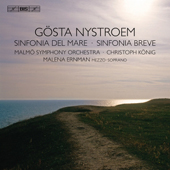
ESSENTIAL RECORDINGS

Four of the six symphonies by the Swedish composer Gösta Nystroem (1890–1966) have
already been released by BIS in performances by the Malmö Symphony Orchestra. The cycle is completed with the
present CD, on which the German conductor Christoph König makes his first appearance on BIS.
The opening work on the disc is Nystroem's first symphony, Sinfonia Breve, which he composed
just before his return to Sweden after having spent the 1920's in Paris. With a duration of close to 20 minutes, the
work is in one movement with a symmetrical arc-shape, features which also characterize the third, and perhaps
best-known of Nystroem's symphonies, Sinfonia del Mare. Dedicated to 'all the sailors upon the
seven seas' the latter work expresses Nystroem's lifelong fascination with the sea and the coast. This fascination he
shared with the Swedish poet Ebba Lindqvist, whose poem Det Enda ('The One Thing') he incorporated in the central
section of the symphony. The soloist on the present recording is the internationally acclaimed mezzo-soprano
Malena Ernman. - {BIS Records}
Composed a mere 20 years after the death of Gustav Mahler, the Sinfonia Breve, Nystroem's first
critical breakthrough, could very well be perceived as a symphonic work by, had he lived longer, Mahler himself. It contains
all the elements that Mahler, as evidenced in his Symphony No. 10, was slowly incorporating into his own framework.
The symmetrical arc-shape, the distant harmonic relations, the pairing of both tight and expansive thematic material,
the evolved counterpoint, the bold dramatic gestures (notice the impact of the heavily dissonant chord right in the
middle of the symphony). A symphonic work in line with composers like Holmboe, Tubin and Rosenberg, which masterfully
combines serious workmanship with emotive effusion, to create an impressive sound world and memorable musical
statement.
Those same dramatic elements are even more at play in the particularly evocative Sinfonia del Mare from 1948.
The opening movement alone is a great example of how, when well manipulated, a simple theme pregnant with potential can
grow to become an impressive climax in just under seven minutes. This spills into a highly energetic Allegro second
movement which adds a piano within the orchestral fabric to great effect, and has more to say within its short duration than works
by other composers lasting ten times longer. The core of the work, based on the Ebba Lindqvist poem, is the beautiful central movement.
Stirring words sung with heartfelt expression by mezzo Malena Ernman. This movement again begs reference to
comparable moments in Mahler symphonies where the voice adds an extra dimension and emphasis to the subject matter at hand. The
movement ends in a beautifully hushed whisper, instantly followed by a serious full-orchestral wallop that opens the fourth movement
in dramatic fashion, itself a movement with conflicting yet moving ideas at its core. The fifth and final movement opens with the same
level of frenetic energy, made even more effective by rapid bursts of piano and snare drum accents, and moments of completely opposite
calm. The main ideas from the opening movement are very effectively re-introduced here and cap the whole symphony with a master's
touch by drifting away, as if carried afar by the sea itself.
If you enjoy the music of the other composers mentioned in this review, or for that matter, orchestral music that speaks eloquently, and
does it all with originality and commitment, than I strongly encourage you to add this unjustly overlooked Swedish composer to your list
of future listening prospects. Especially when performed this well by the Malmö Symphony Orchestra under the noteworthy
and commited direction of conductor Christoph König.
Jean-Yves Duperron - September 2011